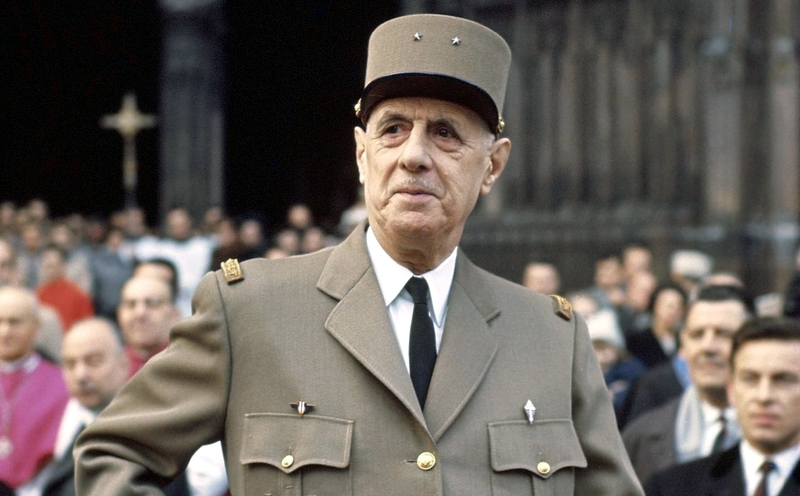To save the country, betray its people

by Lev Tsitrin
Well, the actual quote — from Charles de Gaulle — is a bit different: “In politics, it is necessary either to betray one’s country or the electorate. I prefer to betray the electorate.” But this is a distinction without a difference. He might as well have said “I prefer to betray the democracy.” It all amounts to the exact same thing.
I learned of this wonderful “de Gaulleism” (Machiavelli was not so Machiavellian as to think that in a republic the government should be manipulating the people and lie to them — in The Prince he addressed the natural antagonism arising between an unelected ruler who wants to oppress the people and the people who do not want to be oppressed, suggesting the tricks needed for such ruler to first attain, and then to stay in power — from a Machiavellishly (sorry, de Gaulleishly)-titled “Peace Requires Betrayal” by Shlomo Ben-Ami, a former Israeli foreign minister. In it, Mr. Ben-Ami suggests that Ukraine’s Zelensky will inevitably be forced to seek “an imperfect peace during wartime [which] is inherently divisive and often viewed [by the public] as an act of betrayal.”
Mr. Ben-Ami surely knows a thing or two about betrayal of one’s people for the sake of “peace,” since he was in the government at the heyday of the Oslo process. And while one would think that he would have learned from Israeli elites’ failure to attain peace with Palestinians (something that the rednecks predicted would happen), Mr. Ben-Ami keeps praising the wisdom of betrayal of the electorate. “Masses are asses” after all. Just look at Israeli examples he approvingly uses: “In 2005, Sharon made the single most significant attempt to curb Israel’s obsession with building settlements on Palestinian land in the occupied territories, dismantling the Jewish settlements in the Gaza Strip and a few in the West Bank. … by doing so, Sharon betrayed both his right-wing electorate and the tenor of his entire political career up to that point.” That this step resulted in thousands of rockets launched from Gaza on Israel and proved in retrospect to have been a colossal strategic blunder, apparently does not occur to Mr. Ben-Ami. This should have been a “teaching moment” for the importance of “wisdom of the crowds” but Mr. Ben-Ami is far too smart to let the mere empirical experience alter his deeply-held views that once elections are over, all promises made to the electorate should be null and void.
This is an attitude that Mr. Ben-Ami further affirms in citing the actions of one of Mr. Sharon’s predecessors: “Rabin assured the Israeli residents of the occupied Golan Heights that “it is inconceivable that even if there is peace, we will leave.” A few months later, however, he was negotiating with Syrian President Hafez al-Assad on a peace agreement that would have committed Israel to withdraw from the strategically important region.” This, Mr. Ben-Ami approvingly intones, is because Rabin “refused to be held hostage by fickle public sentiment.” And yet, Syria is now being torn between different forces — Russians, Iranians, Sunni jihadis and God knows who else, imagine those groups now controlling the strategic plateau overlooking the Israeli valley. It would have been a blunder as great as the Gaza pullout turned out to be — but Mr. Ben-Ami does not want to notice. Betrayal of electorate is good — and facts should be damned.
How Mr. Ben-Ami can serve as “a Vice President of the Toledo International Center for Peace” is a mystery to me. A man who is unable to learn from his own experience and his own mistakes is hardly fit to teach others.
Or perhaps, something else is going on here — something entirely different? Aesop tells of a tailless fox (per Google, “A Fox caught in a trap escaped, but in so doing lost his tail. Thereafter, feeling his life was a burden from the shame and ridicule to which he was exposed, he schemed to convince all the other Foxes that being tailless was much more attractive, thus making up for his own deprivation.”) Perhaps the very same psychology is at work here, which would explain Mr. Ben-Ami’s blindness to the fact that the very examples by which he tries to prove that betrayal of the voters is good for the country, proves the exact opposite. Mr. Ben-Ami fell into the “peace process” trap and chose to betray Israelis, losing credibility in the process — and now, like Aesop’s tailless fox, he desperately tries to convince himself that he was in the right, and that others should be like him. Hence, he tries to drag Zelensky down to his level, to betray the Ukrainians and to freeze the conflict with Russia.
Inequality is painful — and Mr. Ben-Ami cannot look at Mr. Zelensky without resentment and remorse. The tailless fox finds the sight of a fox with a tail intolerable. That I think is all there is to Mr. Ben-Ami’s seemingly smart — but in fact exceptionally foolish — essay.